It's been nearly two years since I shared Part 1 of my relationship with alcohol. I wrote about getting sober at 22 in April 2014 when I realized my drinking was unsustainable. I felt proud when I published it because, despite carrying shame about my relationship with alcohol my whole life, sharing my experience felt subversive and liberating. But over the next few days, I went into a shame spiral, and I didn't want to post Part 2 after that.
However, I was recently inspired by
. Substack pushed her miscarriage story into my feed, and it broke me in multiple ways—such a beautiful, honest, raw depiction of something I haven't experienced but feels tender as a mother to a young son. She recently posted about her sobriety journey, too. She’s now two years sober and does AA. I appreciated her candor and felt inspired to finally share the continuation of my story.In Part 1, I shared how I formally walked at graduation with my friends in May 2014 and moved to Portland in August for my first real job. That last college semester before I got sober was a blur of parties and fun. When you're about to graduate, you drink a lot, especially when you're finally 22 and legal.
I got sober on Tax Day—April 15, 2014—almost 11 years ago, which is wild to think about. I was proud of that date. I committed to 90 meetings in 90 days, which is hardcore when you're working full-time without a car, taking buses to meetings all over Berkeley. I even went to meetings when I flew to Mississippi with my brother to check out his future college. I went to daily meetings, no matter what, for three months.
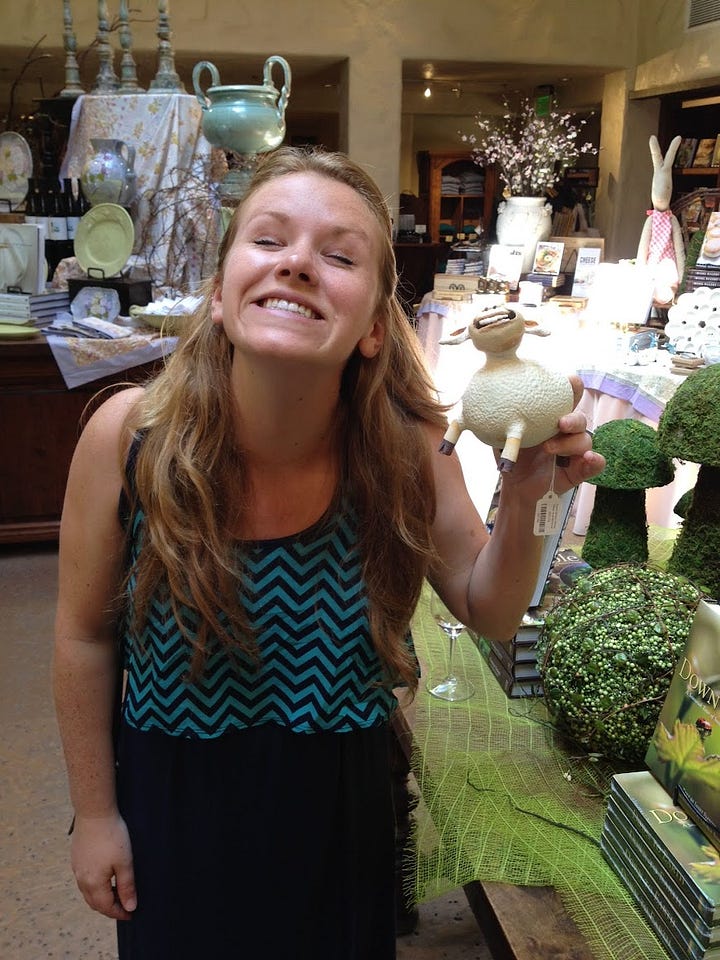
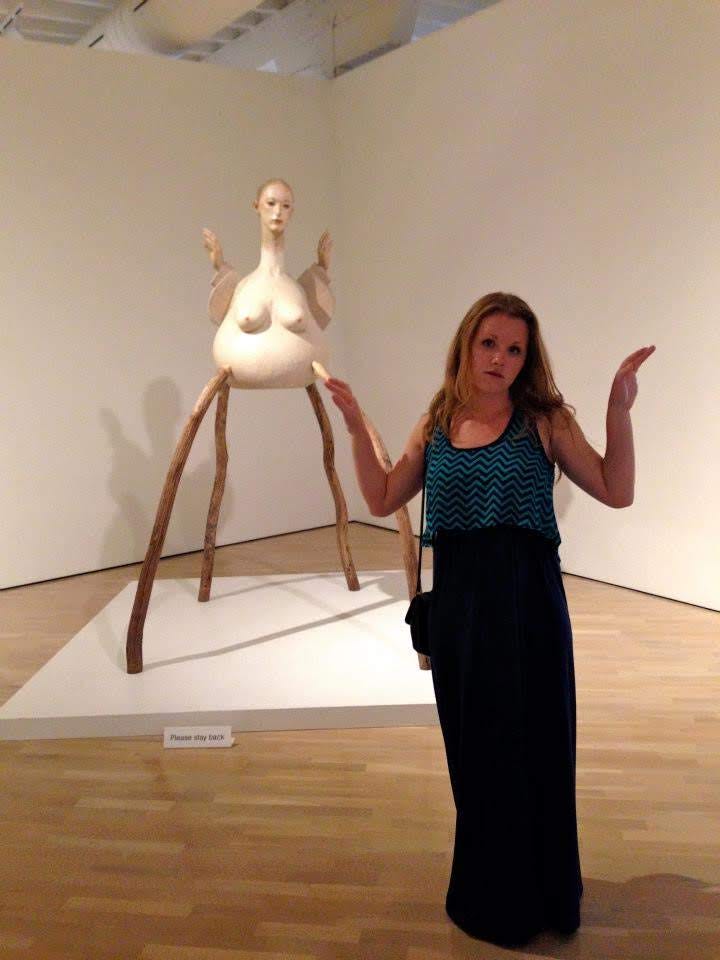
Being 22 and telling yourself you're an alcoholic is excruciating and embarrassing. I have complicated feelings about the word "alcoholic." I never resonated with it during my two-plus years in AA. I hated introducing myself: "Hi, I'm Kendall, and I'm an alcoholic," and then everyone saying "Hi" back. The term felt stigmatizing and polarizing, and my life didn't match my definition of alcoholism. But I knew I had a problem and didn't drink like most of my friends.
Alcoholism was practically encouraged in my sorority—we were known as binge drinkers and sloppy, which my friends embraced. My best friend in college never got sloppy or blacked out. Looking back, I see the difference: she sipped while I raced to empty my cup for refills. At frat parties with unlimited booze, I was like a kid in a candy store: "Let's do shots! Let's do this!" She never did that. I thought we drank the same way, but we didn't. I drank drastically differently, and seeing that distinction helped me realize I didn't want to continue post-college.
In August 2014, four months sober, I relocated to Portland for my first job. I'd met someone at an Oakland AA meeting who gave me her Portland friend's number. I texted: "Hey, I'm Kendall, I'm in AA, and I don't know anyone in Portland." Her response was, "Welcome to the party." I thought, "What? I don't feel that way at all." We met at Fresh Pot near Powell's. She wore bright shorts and was this vibrant person who became my best friend in Portland, though I didn't know it yet. Meeting her, I thought, "She's so full of life and zest. Maybe we could be friends!"
I took my first job at Fisher Investments outside Portland on the Washington side. We worked 6:30am to 4:30pm for atrociously low pay. They scammed you with the job posting for "investment associate," but during interviews, they never clarified what you'd actually do. I'm not a salesperson and never wanted to be one. I love stability. Looking back, I wish I'd done sales for the chance to make more money and hone my selling skills. But society had me believing I was a meek, shy girl who should sit behind computers instead of talking to people.
I made it clear I wanted to be in operations. You could be a client service associate (onboarding new clients) or client operations associate (back office, handling things like wire transfers). Fisher isn't a custodian—we worked with Schwab, Fidelity, etc. We basically faxed paperwork to Fidelity requesting wires. Our clients were mostly elderly people with at least a million in assets who loved Fisher because they didn't need to use the computer to make transactions.
I spent mornings faxing wire requests, moving money, and setting up accounts. I'd go home thinking, "Is this it? Is this why I worked my ass off in school for 18 years? This sucks." The 10-hour days starting at 6:30am were crushing—just paper-pushing. They timed how fast we closed tickets, and initially I competed to be top COP (Client Operations Associate). Then I realized being top COP was empty and sad—no bonus, nothing. I gave up, and it crushed my soul.
All of the other young employees who started after college graduation bonded over alcohol. I felt like an alien who couldn't make friends because I didn't drink or attend parties. It was middle school all over again—I couldn't connect and felt deeply uncomfortable. My only "friend" was my assigned mentor, who sexually harassed me and others constantly. That's another story.
The only good thing was my AA friends. We formed our own little clique and got coffee every Saturday before meetings. I loved having that on my calendar, knowing I'd catch up with friends. I miss that consistency of standing coffee dates. I hiked a lot because I didn't drink, so every Saturday I'd wake up early with AA friends and explore the Columbia River Gorge.
I found a sponsor I liked, which made things manageable. Before that, I'd call my Berkeley sponsor, but I was miserable that first Portland fall and winter. I didn't have friends at work or elsewhere yet. In October, I bought a large bottle of Rogue beer (which I don’t even like), planning to drink it. I stared at it, called my best program friend who said, "Dump it out," and I did—but I was so close to saying, "Fuck this, I need beer to feel normal." Portland is beer-centric, and I felt ridiculous avoiding breweries. I missed beer's casualness—just sitting outside with a drink, no big deal. I thought, "Why can't I do that? I only black out at big parties." (Not true, but I convinced myself.)
After 10 months at Fisher, I hit my one-year sobriety mark in April 2015. I felt amazing and proud. I never thought I could go a year without alcohol. The desire to drink lifted, and I wrote in my journal, "I can't believe I don't crave alcohol anymore. I really did it." I should note I ate tons of candy and gained weight—common in AA as you replace alcohol sugar with other sugar. That first year, I hit McDonald's drive-thrus for McFlurrys after work, feeling like shit and wondering, "Why am I like this?"
My sponsor got me flowers. We had a celebration. I was so proud. But I told her, "I have to quit this job. I can't do it anymore." They say don't quit your job in your first sober year, so one month later in May 2015, after just 10 months on the job, I quit. I felt ashamed—graduating college then immediately quitting my first job before a year. I thought, "I'm broken. I don't know how to adult. What's wrong with me?" But I couldn't do that menial finance work anymore—it wasn't even finance! What I did was embarrassingly stupid.
I decided to get back to my roots. I volunteered at the World Affairs Council in Portland (unpaid), taking the bus downtown from my far east Portland apartment near 82nd and Mount Tabor Park. Mount Tabor was my saving grace—walking is the only thing that makes me feel better when sad. I need beautiful places to walk, and Mount Tabor was my happy place.
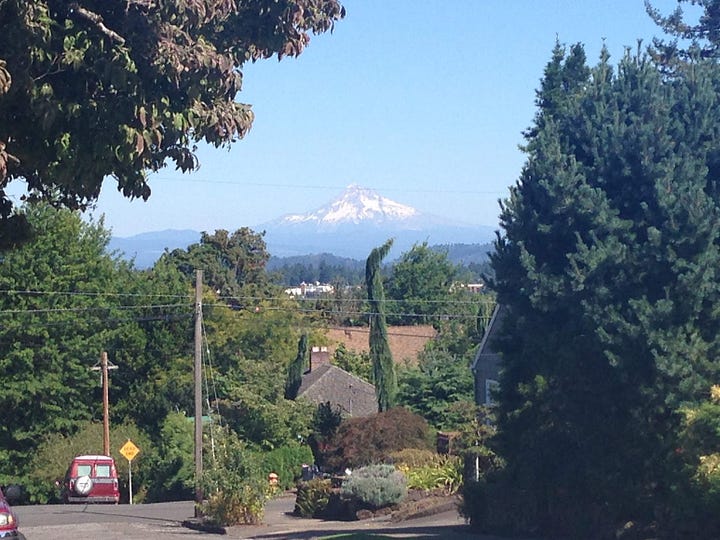
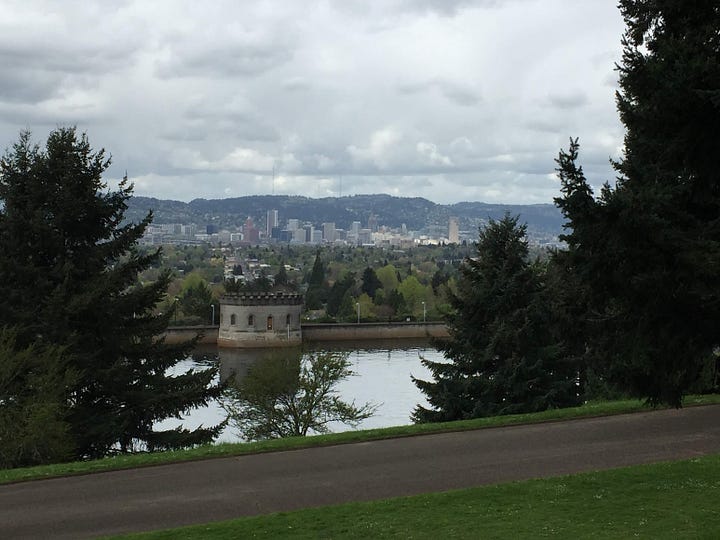
Then a woman messaged me on LinkedIn: "I saw you left Fisher." She liked hiring Fisher people because they're organized. Her small investment performance firm was hiring. I told the World Affairs Council, "I got a job sooner than expected." I quit Fisher in May, volunteered in June, and started the new job in July. It offered better work-life balance with nicer people in a smaller company—more reasonable and manageable.
I moved to a better part of Portland with my better-paying job. I moved to Northwest Portland in July—near Salt & Straw on trendy Northwest 23rd ("Trendy Third"). I was thrilled.
Five months later, in November 2015, I met my future husband on Tinder. He also lived in Northwest. I was nervous for our first date and obviously didn't drink. He seemed surprised when I didn't order anything (he had a beer). My Tinder bio said "Let's get coffee" to avoid alcohol-focused dates, but we ended up at dinner. It was a great first date, and we were immediately inseparable.
When I told him, "I don't drink…," he said, “Oh, okay.” He didn't care! It was a record-scratch moment: "What do you mean you don't care?" I'd been so judgmental about non-drinkers, thinking they were losers, squares, boring. I had such baggage around what "sober" looked like. His lack of concern blew my mind: "What kind of guy doesn't care about this? Why is he so great?"
He immediately introduced me to his friends, making me feel cool. They knew I didn't drink and might have thought it weird, but never said anything. Eventually, I got comfortable saying, "I'm in AA." When I told my boyfriend, he just said, "Whatever. That's cool." Mind-blowing! Looking back, it's clear he was—and is—a gem because he doesn't care about stupid things like whether you get smashed on Saturdays. We still had fun going out. I'd order Shirley Temples, 7UP, or ginger ale. His roommate was also understanding and shared things about his own life. It was awesome. I was 23, and we had the best time.
I stayed sober until August 2016, celebrating two years in April. That summer, I got antsy. I didn't want to do AA anymore. I was sponsoring someone who kept relapsing, and the program felt restrictive. When they strung together sober days and felt great, then relapsed, I hated saying, "Start over." It felt punitive. I felt increasingly distant from the desperation I felt at 22. Now 24, I felt more mature and established—like I could handle beer.
We'd just returned from our first international trip to Costa Rica—a big relationship milestone. I remember saying to my boyfriend, "I want a drink. Just a beer." It wasn't planned or dramatic. We were at River Pig in Portland, and I ordered some unremarkable beer. I drank it thinking, "This doesn’t even taste good," but that was it—the end of AA and my sober chapter.
For years, I’ve wondered: Was I truly an alcoholic, or just a college kid who needed to grow up? These questions have lingered, even as I've established a different relationship with alcohol in the years since.
What I know now is this: Those 2+ years of sobriety were transformative. They gave me time to establish my adult identity separate from drinking culture. They helped me find my husband, who loved me for me, not for how fun I was while drunk. And they gave me a vocabulary to understand my complicated feelings about alcohol that I carry with me still.
Part 3 coming sometime in the next 2 years (lol)!

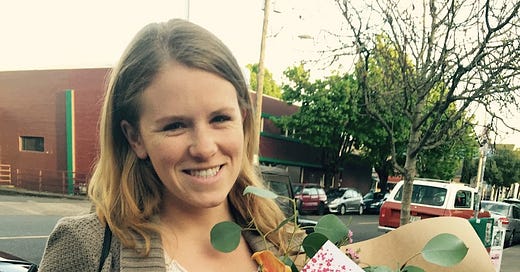



Thanks for sharing this! I didn't know! It's truly impressive that, whether or not you were "really" an alcoholic, at such a young age you had the initiative to take major steps to change what wasn't feeling right for you. That's incredible. Most people in their 20's (and beyond) would not have that thought process, let alone the action to follow it up.
I'm at a point where I've had ~2-4 drinks a year for a few years, for a few reasons ranging from sadness at the damage it causes so many people, as well just feeling like I can't afford to add any setbacks to my health/energy levels. Also my social scenes changed so much, such that I don't find myself in alcohol-centric environments anymore, and I spend a lot of my free time composing, recording, and writing, which IMO are tasks better performed sober. But your writing did remind me of so many fun times in and after college, including visiting you in Berkeley! I think we were drunk already on the bus on our way to the parties.
I've noticed that more and more people around me don't drink or don't drink often, seems to be becoming less popular.
Something I admire in you is how reflective you are, and your curiosity about life and new experiences, including a willingness to try AA and cut out alcohol, including your willingness to add it back and reassess.
Sending love to you and your fam <3
Kendall!! Thank you so much for including me in your story. This is beautiful and honest and I love hearing about different experiences with sobriety and how it fits into your life now. <3